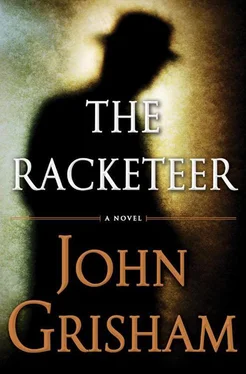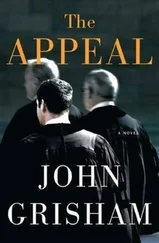John Grisham - The Racketeer
Здесь есть возможность читать онлайн «John Grisham - The Racketeer» весь текст электронной книги совершенно бесплатно (целиком полную версию без сокращений). В некоторых случаях можно слушать аудио, скачать через торрент в формате fb2 и присутствует краткое содержание. Жанр: Криминальный детектив, на английском языке. Описание произведения, (предисловие) а так же отзывы посетителей доступны на портале библиотеки ЛибКат.
- Название:The Racketeer
- Автор:
- Жанр:
- Год:неизвестен
- ISBN:нет данных
- Рейтинг книги:4 / 5. Голосов: 1
-
Избранное:Добавить в избранное
- Отзывы:
-
Ваша оценка:
- 80
- 1
- 2
- 3
- 4
- 5
The Racketeer: краткое содержание, описание и аннотация
Предлагаем к чтению аннотацию, описание, краткое содержание или предисловие (зависит от того, что написал сам автор книги «The Racketeer»). Если вы не нашли необходимую информацию о книге — напишите в комментариях, мы постараемся отыскать её.
The Racketeer — читать онлайн бесплатно полную книгу (весь текст) целиком
Ниже представлен текст книги, разбитый по страницам. Система сохранения места последней прочитанной страницы, позволяет с удобством читать онлайн бесплатно книгу «The Racketeer», без необходимости каждый раз заново искать на чём Вы остановились. Поставьте закладку, и сможете в любой момент перейти на страницу, на которой закончили чтение.
Интервал:
Закладка:
Next is a Rule 35 motion to commute his sentence and set him free. It has been filed in the D.C. federal court from which he was sentenced for cocaine distribution, but Quinn is still in jail in Roanoke. I repeat what I’ve said several times already: I will not complete my end of the deal until Quinn has been released. Period. This has been agreed upon, but it takes the coordinated movements of several people, with instructions now coming from the speck of an island nation known as Antigua. Quinn’s sentencing judge in D.C. is on board, but he’s tied up in court. The U.S. Marshals Service feels the need to intrude and insists on moving Quinn when the time comes. At one point, five of the six lawyers in my meeting are on their cell phones, two while pecking away at laptops.
We take a break, and Vic Westlake asks me to join him for a cold drink. We find a table under a terrace beside a pool, away from the others, and order iced tea. He feigns frustration with the wasted time and so on. I am assuming he’s wearing a wire of some variety, and he probably wants to talk about the gold. I’m all smiles, the laid-back Antiguan now, but my radar is on high alert.
“What if we need your testimony at trial?” he asks gravely. This has been discussed at length and I thought things were clear. “I know, I know, but what if we need some extra proof?”
Since he does not yet have the name of the killer, or the circumstances, this question is premature, and it’s probably a warm-up to something else.
“My answer is no, okay? I’ve made that clear. I have no plans to ever return to the U.S. I’m seriously considering renouncing my citizenship and becoming a full-fledged Antiguan, and if I never set foot on U.S. soil again, I’ll die a happy man.”
“Somewhat of an overreaction, don’t you think, Max?” he says in a tone I despise. “You now have full immunity.”
“That might be easy for you to say, Vic, but then you’ve never spent time in prison for a crime you didn’t commit. The Feds nailed me once and almost ruined my life; it’s not going to happen again. I’m lucky in that I’m getting a second chance, and for some strange reason I’m a bit hesitant to subject myself to your jurisdiction again.”
He sips his tea and wipes his mouth with a linen napkin. “A second chance. Sailing off into the sunset with a pot of gold.”
I just stare at him. After a few seconds he says, a bit awkwardly, “We haven’t discussed the gold, have we Max?”
“No.”
“Let’s give it a go, then. What gives you the right to keep it?”
I stare at a button on his shirt and say, clearly, “I don’t know what you’re talking about. I do not have any gold. Period.”
“How about the three mini-bars in the photo you e-mailed last week?”
“That’s evidence, and in due course I’ll give them to you, along with the cigar box in the other photo. I suspect these little exhibits are covered with fingerprints, both Fawcett’s and the killer’s.”
“Great, and the big question will be, Where’s the rest of the gold?”
“I don’t know.”
“Okay. You must agree, Max, that it will be important to the prosecution of the killer to know what was in Judge Fawcett’s safe. What got him killed? At some point, we’ll have to know everything.”
“Perhaps you won’t know everything; you never will. There will be ample evidence to convict this killer. If the government botches the prosecution, it will not be my problem.”
Another sip, a look of exasperation. Then, “You don’t have the right to keep it, Max.”
“Keep what?”
“The gold.”
“I do not have the gold. But, speaking hypothetically, in a situation like this it seems to me the loot belongs to no one. It’s certainly not the property of the government; it wasn’t taken from the taxpayers. You never had possession of it, never had a claim. You’ve never seen it and you’re not sure, at this point, if it even exists. It doesn’t belong to the killer; he’s a thief as well. He stole it from a public official who obtained it, we assume, through corruption. And if you could possibly identify the original source of the loot and tried to return it, those boys would either dive under a desk or run like hell. It’s just out there, sort of in the clouds, like the Internet, owned by no one.” I wave my hands at the sky as I finish this well-rehearsed response.
Westlake smiles because we both know the truth. There’s a twinkle in his eye, as if he wants to laugh in surrender and say, “Helluva job.” Of course, this doesn’t happen.
We make our way back to the suite and are told that the judge in D.C. is still occupied with more important matters. I’m not about to lounge around the table with a bunch of federal boys, so I go for a walk on the beach. I call Vanessa, tell her things are proceeding slowly, and, no, I have not seen handcuffs or guns. So far, it’s all aboveboard. Quinn should be released soon. She tells me Dee Ray is in Dusty’s office waiting for their brother.
During his lunch break, the judge who had sentenced Quinn to seven years for trafficking reluctantly signed a Rule 35 order of commutation. The day before he had chatted with Stanley Mumphrey, Victor Westlake and his boss, George McTavey, and to underline the importance of what was before him, the Attorney General of the United States.
Quinn was immediately taken from the jail in Roanoke to the law offices of Dusty Shiver, where he hugged Dee Ray and changed into some jeans and a polo. One hundred and forty days after being arrested as a fugitive in Norfolk, Virginia, Quinn is a free man.
It’s almost 2:30 by the time all the orders and documents are properly signed, examined, and verified, and at the last minute I step outside the room and call Dusty. He assures me we’ve “got ’em by the throat,” all paperwork is in order, all rights are being protected, all promises are being fulfilled. “Start singing,” he says with a laugh.
Six months after I arrived at the Louisville Federal Correctional Institution, I agreed to review the case of a drug dealer from Cincinnati. The court had badly miscalculated the term of his sentence, the mistake was obvious, and I filed a motion to get the guy released immediately with time already served. It was one of those rare occasions in which everything worked perfectly and quickly, and within two weeks the happy client went home. Not surprisingly, word spread through the prison and I was immediately hailed as a brilliant jailhouse lawyer capable of performing miracles. I was inundated with requests to review cases and do my magic, and it took a while for the buzz to die down.
Around this time, a guy we called Nattie entered my life and consumed more time than I wanted to give. He was a skinny white kid who’d been busted for meth distribution in West Virginia, and he was adamant that I review his case, snap my fingers, and get him out. I liked Nattie, so I looked at his papers and tried to convince him there was nothing I could do. He began talking about a payoff; at first there were vague references to a lot of money stashed somewhere, and some of it might be mine if I could only get Nattie out of prison. He refused to believe I could not help him. Instead of facing reality, he became more delusional, more convinced I could find a loophole, file a motion, and walk him out. At some point, he finally mentioned a quantity of gold bars, and I figured he had lost his mind. I rebuffed him, and to prove his point he told me the entire story. He swore me to secrecy and promised me half of the fortune if I would only help him.
As a child, Nattie was an accomplished petty thief, and in his teenage years drifted into the world of meth. He moved around a lot, dodging drug enforcement agents, bill collectors, deputies with warrants, fathers with pregnant daughters, and pissed-off rivals from other meth gangs. He tried several times to go straight but easily fell back into a life of crime. He was watching his cousins and friends ruin their lives with drugs, as addicts and convicted felons, and he really wanted something better. He had a job as a cashier in a country store, deep in the mountains around the small town of Ripplemead, when he was approached by a stranger who offered him $10 an hour for some manual labor. No one in the store had ever seen the stranger, nor would they ever again. Nattie was making $5 an hour, cash, off the books, and jumped at the chance to earn more. After work, Nattie met the stranger at a pre-arranged spot and followed him along a narrow dirt trail to an A-frame cabin wedged into the side of a steep hill, just above a small lake. The stranger introduced himself only as Ray, and Ray was driving a nice pickup truck with a wooden crate in the back. As it turned out, the crate contained a five-hundred-pound safe, too much for Ray to handle by himself. They rigged a pulley with a cable over a tree branch and managed to wrestle the safe out of the truck, onto the ground, and eventually into the basement of the cabin. It was tedious, backbreaking work, and it took almost three hours to get the safe inside. Ray paid him in cash, said thanks and good-bye.
Читать дальшеИнтервал:
Закладка:
Похожие книги на «The Racketeer»
Представляем Вашему вниманию похожие книги на «The Racketeer» списком для выбора. Мы отобрали схожую по названию и смыслу литературу в надежде предоставить читателям больше вариантов отыскать новые, интересные, ещё непрочитанные произведения.
Обсуждение, отзывы о книге «The Racketeer» и просто собственные мнения читателей. Оставьте ваши комментарии, напишите, что Вы думаете о произведении, его смысле или главных героях. Укажите что конкретно понравилось, а что нет, и почему Вы так считаете.












